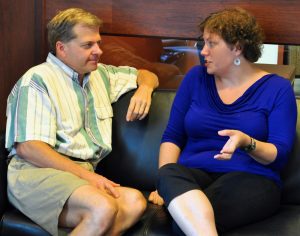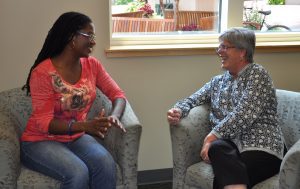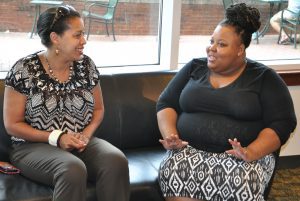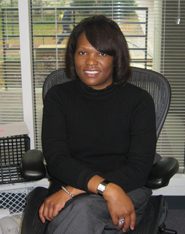Mentor-Mentee Stories
Below are a few examples of mentor-mentee experiences that highlight the benefits of the program, not only for the new faculty mentees, but also for the mentors…
2012-1013 Todd Steck, Associate Professor, Biology and Sara Levens, Assistant Professor, Psychology

Todd: My experience with Sara was different than what I expected. Instead of a newly minted PhD with a deer-in-the-headlights look, I found an experienced professional who was already familiar with the workings of a large university. So, instead of me guiding Sara through the political minefields of academia, I ended up just being a friend to someone who was new to the area. With Sara this was an easy gig. The role of the mentor is to help the mentee succeed at UNC Charlotte. That help can be of many types; to learn how best to help requires getting to know your mentee. If both parties are interested in having the relationship work doing that isn’t hard, and it can actually be quite enjoyable. Sara and I will continue to get together for coffee about once a month. Some of our conversation will focus on her progress towards being reappointed and earning tenure, but much of it will consist of two friends catching up. It stopped feeling like a mentor-mentee relationship a long time ago.
Sara: The mentoring program provided the extra support and guidance that I needed to adjust, feel comfortable and succeed as a new professor at UNCC. I looked at mentor relationship as an opportunity for frank one-on-one conversation about whatever I needed to talk about–from typical topics of teaching, building a research program, and inter-department relations, to personal topics surrounding my adjustment to being a professor after years of postdoctoral and graduate school training. I really enjoyed talking with my mentor. Todd and I have become friends and colleagues. He offered me not only the answers to the questions that I asked, but he also anticipated topics and questions that I did not yet have the experience to know to ask about. I fully and whole-heartedly recommend the mentoring program. But like anything else, you get out of it what you put into. I trusted my mentor and opened up to him about personal questions and concerns. Your mentor will look to you to communicate what type of relationship and information you want. I communicated my expectations, questions and support needs and was therefore able to get everything I needed from my mentor and a whole lot more—a new friend and support person at a university where I hope to be until I retire
2012 -2013 Sue Marchetti, Director of Field Education, Lecturer, Social Work and Kendra Jason, Lecturer, Sociology

Sue: Mentoring through Advance has been one of the most rewarding aspects of my appointment as a faculty member at UNC Charlotte. One of the most difficult aspects of joining the faculty was understanding the culture of academia, getting to know colleagues, and navigating the system. The opportunity to help a new lecturer successfully assimilate into the campus community and develop a friendship with a colleague was wonderful! I believe that I have learned as much from Kendra and look forward to our ongoing relationship as colleagues and friends.
Kendra: I am so grateful for my mentoring experience! Upon being hired last fall as a lecturer and academic advisor in Sociology I was unsure if mentorship would be available to me. Too many universities do not appreciate the need for non-tenure faculty to have an opportunity to establish mentoring relationships to learn and grow with the organization. This is not the case for UNC Charlotte. I was connected with Sue Marchetti, a senior lecturer and coordinator in the Social Work Department, through the ADVANCE faculty mentoring program. This was a new experience for both of us, but, Sue and I hit it off right away. We decided to meet regularly on campus for lunch or coffee to talk about work, family, and life in general. And we have fun! We are open to learning from each other and building on our relationship. I have learned from my mentorship with Sue that everyone has something to contribute. It is important to share your knowledge with those around you. I thank the ADVANCE office for having the foresight to invest in new faculty mentoring for the long-term benefits. I especially thank my mentor, Sue, for being open to a new experience. I am now further encouraged to invest in this university which has invested in me.
2011-2012: Sonya Ramsey, Associate Professor, History and Takiyah Amin, Assistant Professor, World Dance

Takiyah: Truthfully, when I was on the job market, I did not want to take a position at an institution that didn’t have some kind of structured mentoring program for new faculty. The fact that UNC Charlotte has such a program signaled to me early on that this is a place that invests in new faculty. The pairing process through ADVANCE was very easy and I was able to get matched a mentor who met my needs and interests. More than anything, through the program I found a mentor who was willing not to just tell me about UNC Charlotte but to show and share resources with me that would aid in my success. My mentoring experience was wonderful and it has extended long past the end of the program — we are going on three years and counting! What I took away from the program is that there are people at UNC Charlotte who are invested in my success and there are resources here that I can access that support my professional development as a scholar and educator. I came out of the program feeling empowered to chart a healthy pathway toward reappointment and tenure. My mentor, who met with me on a regular basis and as needed via email, phone, etc. helped me to position myself for optimum success as a new faculty member at UNC Charlotte. Coupled with the workshops sponsored for new faculty by the ADVANCE office, the mentoring program was a holistic approach to fostering success for new faculty. I highly recommend it!
Sonya: When I first arrived at the University of North Carolina at Charlotte in 2007, I was a new faculty, but I could not participate in the ADVANCE program because I was tenured at my previous institution. Nevertheless, it was exciting to see my colleagues participate in programming that not only helped them succeed as a new academic, but also allowed them to form a cohort of fellow faculty from different disciplines. I have never had a sole mentor as a graduate student or as an assistant faculty member, but I received valuable advice from fellow graduate students and faculty members. So I was really excited when asked to serve as a mentor in the ADVANCE program. Over the years, I have had several mentees in the ADVANCE program including Janaka Lewis and Jillian Tullis. I have enjoyed working to help them when asked and to the best of my ability. My most recent mentee is Takiyah Amin, an Assistant Professor in the Department of Dance. Dr. Amin is one of the most determined young women I have ever met. I was happy to help her adjust to academic life by offering teaching advice and aiding her in securing research grants.
Debra Smith, Associate Professor, Africana Studies: Mentee 2006, Mentor 2011

I found the Mentoring Program to be especially helpful to me when I was a junior faculty member. I came to UNC Charlotte as a Lecturer. When I was hired as an Assistant Professor, I still had the mindset of a teaching faculty member since that was my history with this university. My mentor was able to set me on a solid research tract, direct me toward grant opportunities, and even read some of my writing prior to my sending it out for publishing consideration. He motivated me and kept me focused on reappointment.
As a mentor, I strived to provide the same sound advice to my mentee. I wanted to be a helpful resource for him to succeed and also to decide to remain at UNC Charlotte as a faculty member. I found that sometimes it helps just to have someone as a sounding board.